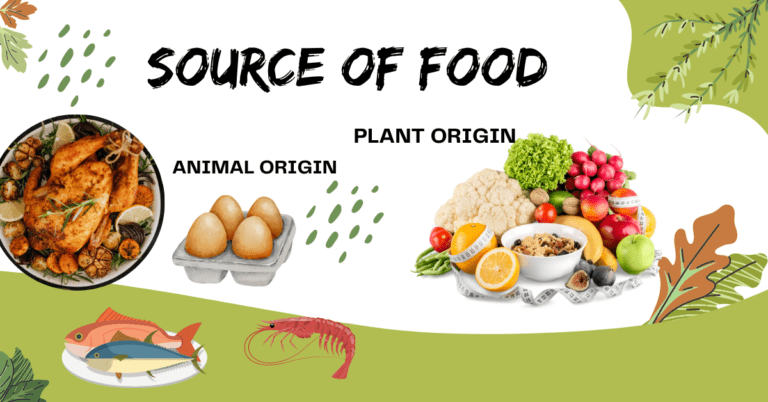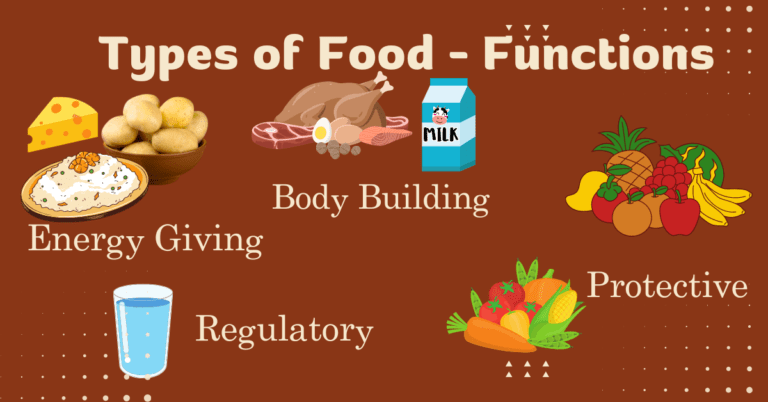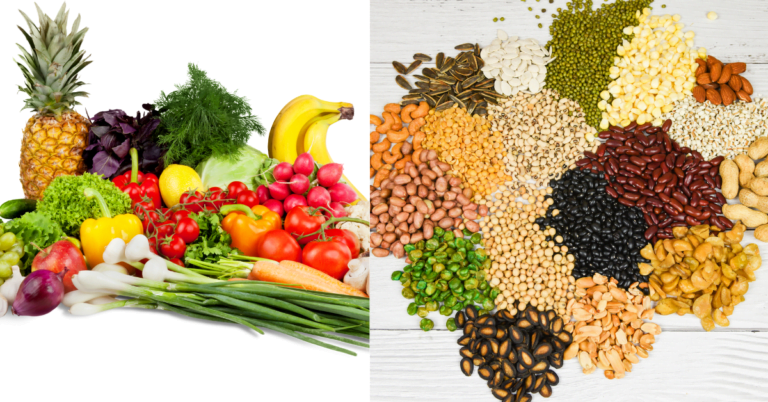“Let food be thy medicine and medicine be thy food.” – Hippocrates
Any matter which provides nourishment to maintain the life and growth of living beings. Both animals and plants eat and drink, gathering nutrients from these matter.
We all need food to continue living. Without food, we may not even survive.
Eating the right food helps to provide Nutrition. Food contains different nutrients that are required for survival.
Why Food is Important?
Food is important for the survival of living organisms. Without food, one may survive for a few days. But in the long run, food is required for growth and overall development of the body.
Food is one of the basic but essential requirements for life. One should eat nutritional foods. Food contains nutrients which help to
Provides energy so that our body can function, move and perform work.
Building of new cells and tissues.
Growth and repair of tissues and muscles.
Functioning of vital organs in our body.
Build a good immune system to fight off diseases.
Foods provide energy, and the energy in food is as Calories. Different foods have different Calories. Some foods are high in Calories providing more energy.
Calories are the amount of energy released after the breakdown of food in the body. Calorie intake depends on age, sex, height weight and body.
Extra Calorie intake is stored in the form of fat in the body.
Food Supply
We get food mainly from Plants and Animals. Likewise, they are classified into two categories:-


Plant Origin –
Food which we get from plants only. Here the source is Plants.
Examples – Cereals (Wheat, rice, maize, Corn….) Pulses (Pea, Moong, Gram…..)
People who eat only plant products are called vegetarians.
Animal Origin –
Food which we get from Animals only. They are animal products.
Examples – Meat, Egg, Milk, Fish and Milk products
The people who eat both Plants and Animals are called non-vegetarians.
Why food Classification is important
Foods are classified according to their nutrient values. It helps to identify which food contains which type of nutrients.
It also helps to understand the reason for malnutrition and other diet-related diseases.
Including Super Foods in our daily meals, provides complete nourishment to the body. Thus preventing diseases and syndromes resulting from nutrient deficiency.
It also helps to create the Food Chart/Diet plan by Dieticians and health-conscious people who aim for better health and growth of the body.
Classification of food tells us which food is required to prevent nutrition deficiency and lead to good health
It helps to maintain a proper and balanced diet and lead a healthy lifestyle devoid of diseases and illness.
Food Classification by Function
As we all know, food contains nutrients and energy that help to keep us going. It helps to perform daily tasks and development of the body.
Food helps to build immunity and stay healthy.


Energy-giving Food –
These foods provide energy to carry out day-to-day tasks. Playing, working and thinking require energy.
Lack of energy results in tiredness and you may not be able to carry out your day-to-day tasks.
Examples are Rice, Potatoes, butter, cheese and sugar.
Body Building Food –
These foods help to build up muscles and bones. They also help in the repair of damaged tissues and muscle ruptures.
Mainly protein-rich foods help in bodybuilding.
Examples are Milk, Pulses, Meat and Eggs.
Protective Food-
Food that keeps us healthy by increasing immunity and fighting off various diseases. They help us to stay healthy and in good condition.
Fruits and Vegetables are the main foods that protect from illness.
Examples are Apples, Bananas, Cauliflowers, Broccolis and Carrots.
Regulatory Food-
These types of foods are Water and Roughage.
Water
Water intake is very important for our body. It helps to regulate body temperature and help in the transportation of nutrients and Oxygen to cells.
It also helps to remove waste from the body in the form of Urine, sweat and bowel movement
Roughage
Roughage also plays an important role and is very much required by the body. They do not provide energy or nutrients but are very much required like other foods.
They are part of the food, mostly fibrous parts that are not digestible.
Helps in bowel movement.
Prevents constipation which most people deal with.
Helps to retain water in the body.
Helps in the movement of food and waste in the gut.
What are Whole Foods and their importance?
Whole food refers to food in its original form. This means food reaching us directly fresh post their production and harvest.
There are foods available in the market which has been processed further and also foods which are available in unprocessed form.
So, whole foods are free from any additives and artificial substances.
There are foods as well which have been processed minimally and are also free from artificial and chemical substances.
For example Frozen produce or Whole wheat flour.


It is recommended from the health aspect, one should avoid processed food. Since they contain additives and artificial substances which affect health.
Whole food is considered to be Healthy and one should include them in diet.
When food is processed additives and artificial substances are added. For example Far, Sugar and Salt. Important nutrients and fibre from the food are removed during processing.
Processed food and its effect on health
Processed foods are refined foods which have been modified further by the addition of additives and artificial substances.
As a result, these processed foods do not add value to health and well-being. Instead, they increase the risk of cardiovascular and Chronic diseases and result in diabetes and obesity.


Processed food examples – White bread, pasta, Frozen and Canned fruits and vegetables
Why Whole food is important?
Whole foods are considered healthy and should be recommended in the diet. This is due to the following reasons:-
Healthy Fats
low in sugar
Higher Fibre
Improve gut health
Prevent diabetes and obesity
Reduces risk of cardiovascular diseases
Source of Whole foods
Grains – Whole grains such as brown rice, oatmeal and quinoa are healthy and one should include them in the diet.
They have healthy fats and fibre and are good for health.
Fruits and Vegetables – Fresh fruits and vegetables are considered whole food.
Lentils – Mostly Pulses like Kidney beans, red lentils, moong, yellow gram, and chickpeas are good sources of proteins are Whole foods.
Nuts – Almonds, Cashew, Peanuts, and Walnut are also whole foods considered more healthy
Seeds – Pumpkin seeds, sunflower seeds, Chia seeds, Flax seeds
7 Food Groups
Different Foods Plant and Animal-based are classified into 7 groups and must be taken in different quantities.
Each of these groups provides different nutrients.
Drinks –
Every living organism is required to remain Hydrated. This is possible only after increasing the intake of Liquids.
Water is the most important one and should be consumed regularly. Soups and Fruit Juice are also examples of Drinks.
Dairy –
Milk and its products are part of this group. They are equally important as they provide protein along with Calcium.
Examples are Milk, Cheese, Curd, Butter and Ghee.
Meat & Poultry –
Meat and eggs are major sources of proteins and minerals. They should be consumed daily.
Fish & Seafood –
They provide proteins, minerals and fats and are equally important.
Examples are Fish, Shrimp, Prawns and Crabs.
Fruits and Vegetables –
Fruits and Vegetables to be consumed daily and that too fresh. They provide vitamins and fibre.
Examples are Apples, Bananas, Cauliflower, Carrots and Avocado.
Carbohydrates –
They are the main source of energy for the body. They should be eaten regularly and be part of every meal.
Examples are Grains (Rice, wheat, quinoa) and Legumes (Beans, Peas and Lentils)
They provide protein, Vitamins & minerals
Fats –
We should focus more on unsaturated fats. Unsaturated fats are primarily mono or polyunsaturated fats. Fats are required in less quantity.
Examples are Olive oil and flaxseed oil
Conclusion
Food is important for survival. One has to select the right food and the right quantity for Healthy living and well-being.
Whole foods are important as compared to processed food.
Please Click Here to visit my Space in Quora. This space is related to the topic of Nutrition and Health. You can find more Posts and FAQs. You can also Follow my space and ask questions.
If you are interested in joining and contributing to the Space. Please scroll down and click on “Want to be a contributor? Apply here”.
Related Posts
FAQs – Frequently Asked Questions Answers to the frequently asked questions related to...
Answers to the frequently asked questions related to Nutrition for good Health and Well-being...
On-page SEO, the name defines where the optimization would be required. It is the process for...
Based on the techniques which are being followed for the optimisation of Webpage. The following are...
SERP Elements (Search Engines Result Page) Besides just displaying the title and the website name...
The primary importance of SEO is to rank the website higher, increase visibility and attract large...
SEO is a process that is very important for ranking any website. It ranks websites higher so that...
Hiring in BPO is an ongoing activity. This doesn’t stop, goes on based on the requirement...
BPO services are not limited to one sector. BPO Services has grown tremendously and occupied more...









